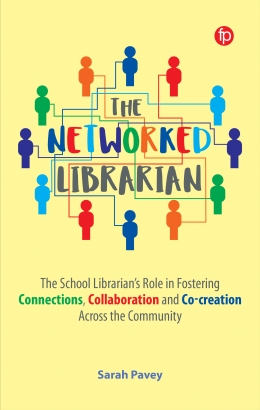
Primary tabs
You don't need to be an ALA Member to purchase from the ALA Store, but you'll be asked to create an online account/profile during the checkout to proceed. This Web Account is for both Members and non-Members.
If you are Tax-Exempt, please verify that your account is currently set up as exempt before placing your order, as our new fulfillment center will need current documentation. Learn how to verify here.
- Description
- Table of Contents
- About the author
- Reviews
School librarians need to engage with their staff and community to help define their role, raise their profile and make a real impact. Whether you’re working alone in a school library, a team member or a leader you’ll find practical advice about building these important business relationships in this book by library and education consultant Sarah Pavey.
The role of the school librarian is varied, extending far beyond resource management and collection curation to include collaboration and partnerships with internal and external stakeholders for both curriculum support and leisure time. Whether working individually, as part of a library team, or as part of a broader team within the school, local or global community, building and maintaining relationships has become an essential skill. The Networked Librarian is an invaluable guide to working effectively with the whole school and beyond. Bringing together the author's extensive experience in school libraries and education, it provides a means for school librarians to engage with their communities to create real impact.
The book delves into how team working can enhance motivation, the development of self-esteem, and how to deal with more challenging situations for amicable resolution. Consideration is also given to how networking can be used to promote library resources and services for impact, whether that is within school or in the local or global community. Overall, this book demonstrates the importance of creating networks to underpin practical applications of forming connections, collaborating with colleagues and co-creating and developing ideas to enhance the school library services.
Introduction
Acknowledgements
-
Understanding the dynamics of working relationships
Defining teams Preparing to work as a team in practice Applying theoretical models in practice
-
Working through change
Adapting to change
Change curve
Implementing change
-
Communication
Choosing the correct communication channel
Encoding and decoding
Verbal communication
Tone of voice and listening skills
Body language
Cultural differences
Understanding the dynamics of conversation
Communication styles
-
Dealing with difficult people
What is challenging behaviour and why does it arise?
Working through conflict
Managing a difficult meeting
Being assertive
-
Librarians as leaders
What is leadership?
Why is leadership important?
Leadership in practice
Leading a library team
Leading other teams
-
Working with students
Adapting communication style for student interaction
Ensuring a safe and welcoming environment
Working with student library helpers
Behaviour management
-
Working with teachers
Why is collaboration with teaching staff important?
Overcoming barriers to collaboration with teachers
Teacher-librarian collaboration in practice
-
Working with senior leaders, school governors and the inspection team
Senior leadership teams
School governors
School inspectors
-
Working with parents, guardians and carers
Why is it important to work with parents, guardians, and carers?
How can we be involved with parents, guardians, and carers?
Parents as volunteers
Parents as advocates
How can we communicate with parents?
Dealing with difficult parents
Effective parent teams
-
Working other members of the school community
Working with support staff for student achievement and wellbeing
Working with support staff for effective library management
-
Building networks
Competencies for networking
Creating networks within our schools
Creating and using external networks
Sarah Pavey
Sarah Pavey has worked as a school librarian for over 20 years and is founder of education training company and consultancy SP4IL. She holds degrees in biochemistry and information science and is an established author and regular speaker at conferences for school libraries as well as wider education issues. Sarah is a Fellow of CILIP and the Royal Society of Arts and works with the Electronic Platform for Adult Learning in Europe (EPALE) in the field of adult education. Her training courses, both home and abroad, on a range of topics including playful learning, are practical and acclaimed for being rooted in theory.
Have you read this book? Leave a review!


